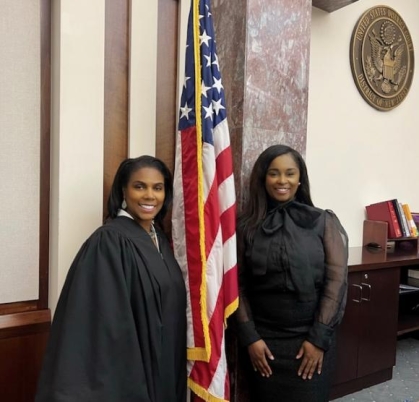Prestigious Judicial Clerkships: RLaw Alumni Rise to the Challenge

For new attorneys, a judicial clerkship is an experience like no other. It’s an opportunity to intimately understand the judicial system, collaborate closely with a judge, and fine tune various legal skills in a unique environment. That said, even applying for one of these positions can be overwhelming, and not just because it’s highly competitive—most applicants find themselves juggling a law school career or a full-time position while also compiling and tracking several applications at various stages. The good news is that Rutgers Law School’s Center for Career Development can help carry some of the load.
“They really laid out the timeline of when I needed to gather and submit all my materials, from my resume to cover letters and letters of recommendation, and I followed their recommendations step by step,” says Grace Baccare ‘22, who clerked with the Hon. Lee A. Solomon of the Supreme Court of New Jersey. “It’s not uncommon to apply for clerkships with anywhere from 10 to 20 judges, so staying organized is incredibly important, and the career center helps provide that support if you want it.”
While Baccare utilized the career center’s resources as a third year law student, they remain available for alumni long after they graduate. “My connections at the career center provided helpful insights throughout my clerkship application process, in addition to letting me know about job opportunities I might be interested in,” says Victoria Salami ‘17, who clerked for the Hon. Susan D. Wigenton in the United States District Court for the District of New Jersey in 2022. “As a lawyer, relationships are your currency, and it’s important to form and nurture those relationships.”

From Law School to Judge’s Chambers
Baccare was interested in a clerkship for two main reasons. First, she wanted to work in the New Jersey court system and develop a connection with a local judge. But she also knew that it would be a valuable stepping stone between law school and private practice. “I knew I was likely going to work at a law firm,” she explains, “so I wanted to get a sense of what judges were looking for and what I would need to provide as an attorney to be successful.”
As a clerk, Baccare performed legal research, prepared written memoranda on novel issues of law, and assisted Hon. Solomon in the preparation of opinions. “Gaining an understanding of how a case moves through the court system was really helpful, especially in my current position as an environmental law attorney in New Jersey,” she says. “As a law clerk, I gained an understanding of what works in a brief and what doesn’t, and I use those lessons today in practice.”
As it turned out, Baccare confirmed what Justice Solomon already knew to be true about Rutgers Law alumni. “Almost every year I have served on the New Jersey Supreme Court I hired a graduate of Rutgers Law School as a law clerk,” he says. “I have never been disappointed, and Grace was one of my best. She was a pleasure to work with because she is smart, personable, is an excellent researcher and writer, and works well with others.”

An Alternative Path
Unlike Baccare who clerked right out of law school, Salami had almost five years of civil litigation experience as well as a judicial internship with the Hon. Michael A. Shipp, USDJ under her belt before embarking on her federal clerkship. “I wanted to take my career to the next level and started checking in with my mentors, including Judge Shipp,” she says. “He advised that it was a great time for a federal clerkship, as it would be a valuable stepping stone in my career as a litigator and afford me the opportunity to learn firsthand from a distinguished jurist.”
As a federal clerk, Salami wrote opinions, conducted legal research, analyzed case records, and thought through decisions with the judge. Her work served as a vital function in Judge Wigenton’s chambers, and she proved to be a well respected asset. “I thoroughly enjoyed having Victoria as a part of my chambers team,” says Judge Wigenton. “She exhibited keen intellect, was very diligent, and has a strong work ethic. I have had other Rutgers alums serve as my law clerk. They performed their responsibilities admirably as well, and I will continue to hire clerks from Rutgers.”
For Salami, the experience was invaluable, and she recommends it highly to any Rutgers Law student or alumnus interested—and encourages them to face the challenge head on. “I believe clerking gave me more experience than any firm could have given me at that early stage of my career, because I was working on a variety of civil and criminal matters that challenged me to tackle some of the most complex and novel legal issues at the federal level,” she explains. “It was without a doubt the best decision I could have made in my career thus far.”